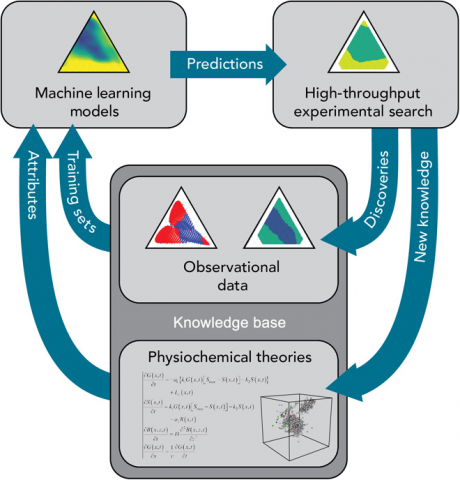
Journal Club do Departamento de Física dos Materiais e Mecânica
Apresentação de artigo por Rafael Rodrigo Garofalo Paranhos
21/08, 4ª feira, 12h10. IFUSP, Ed. Alessandro Volta - bloco C, Sala de Seminários José Roberto Leite.
With more than a hundred elements in the periodic table, a large number of potential new materials exist to address the technological and societal challenges we face today; however, without some guidance, searching through this vast combinatorial space is frustratingly slow and expensive, especially for materials strongly influenced by processing. We train a machine learning (ML) model on previously reported observations, parameters from physiochemical theories, and make it synthesis method–dependent to guide high-throughput (HiTp) experiments to find a new system of metallic glasses in the Co-V-Zr ternary. Experimental observations are in good agreement with the predictions of the model, but there are quantitative discrepancies in the precise compositions predicted. We use these discrepancies to retrain the ML model. The refined model has significantly improved accuracy not only for the Co-V-Zr system but also across all other available validation data. We then use the refined model to guide the discovery of metallic glasses in two additional previously unreported ternaries. Although our approach of iterative use of ML and HiTp experiments has guided us to rapid discovery of three new glass-forming systems, it has also provided us with a quantitatively accurate, synthesis method–sensitive predictor for metallic glasses that improves performance with use and thus promises to greatly accelerate discovery of many new metallic glasses. We believe that this discovery paradigm is applicable to a wider range of materials and should prove equally powerful for other materials and properties that are synthesis path–dependent and that current physiochemical theories find challenging to predict. Acesse o artigo aqui.
Imagem: Schematic depiction of a paradigm for rapid and guided discovery of materials through iterative combination of ML with HiTp experimentation.
Data do Evento:
21/08/2019 - 12:00
Data de Término:
21/08/2019 - 18:00













